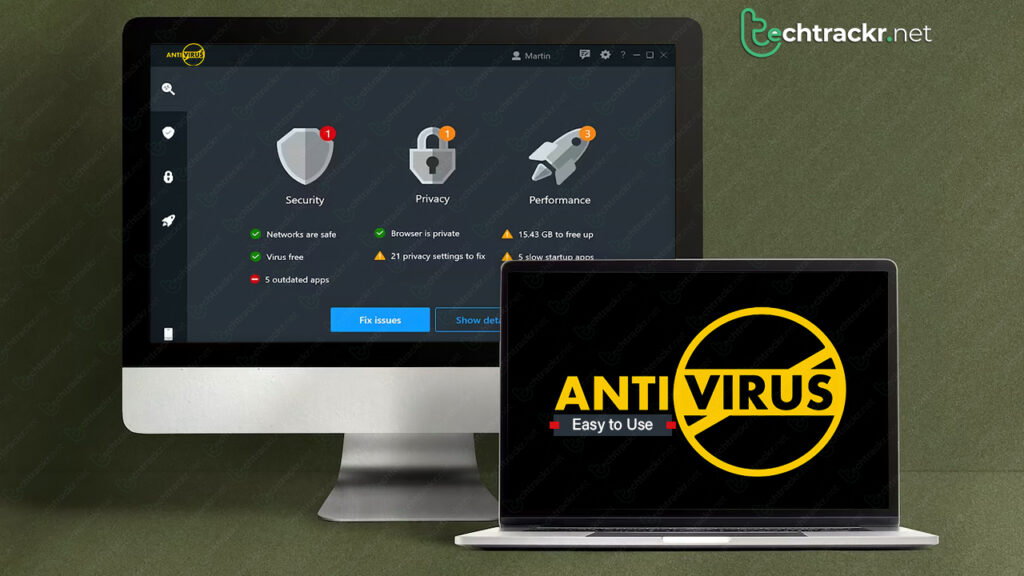
If you’re on the hunt for the top-notch antivirus for Windows, I get it—it’s a jungle out there with so many choices, and you might be feeling a bit lost. In this guide, I’ll cover the basics, like what exactly an antivirus is, what it does, and what key factors to consider when making your choice.
Antivirus has always been the trusty go-to for tackling malicious software and the tricks of cybercriminals. And guess what? It still holds that title. From malware and phishing scams to ransomware and DDoS attacks, the internet is teeming with a bunch of threats. But, to kick things off, let’s get back to the fundamentals: What in the world is antivirus software, and what’s its job?
Having a solid antivirus is crucial. It cuts down on those moments when you find yourself scrambling to clean up the aftermath of a nasty malware hit. Before you dive into the quest for your ideal security software, let’s break down how exactly an antivirus does its thing.
Also Read: How to clean your computer from malware

How does antivirus work?
Alright, so let’s talk about the backbone of an antivirus: reactive scanning. In a nutshell, it goes through any new program or file before you open it, making sure it’s not a known malware or acting like one. This all happens behind the scenes, and the file or program only gets the green light to open once the antivirus has wrapped up its scan.
Now, let’s talk about the full system scan—a deep dive where the antivirus combs through every inch of your device to spot any lurking malware or shady software and files.
And here’s a heads up: some antivirus programs also have your back by blocking malicious ActiveX or Java scripts. These sneaky scripts can turn your PC into a part of a botnet, inject code, or pull off drive-by downloads. It’s like your antivirus acting as a vigilant bouncer for your computer.
Malware database is necessary
But here’s the catch: scans won’t work if the program doesn’t know what it’s hunting for. That’s why every antivirus software packs a database filled with the deets on known malware. It takes each scanned file and plays detective, comparing it to the contents of the database.
They tinker with this database a lot, like almost every day kind of frequently. That’s why we’re always pushing folks to keep their software in the loop, especially their antivirus. Staying on top of updates is your ticket to a safer online journey. It significantly lowers the odds of crafty hackers taking advantage of a weakness in your software that hasn’t been patched up yet.
Now, antivirus programs aren’t just one-trick ponies—they’ve got this thing called “heuristic analysis” up their sleeves. Essentially, if a file acts like malware, even if it’s not in the database, the antivirus will flag it. That’s why you sometimes see some antivirus programs mistakenly tagging safe programs, like Chrome, as viruses. They call this little mix-up a “false positive,” and it’s a yardstick for rating how good an antivirus really is.
Updates and malware removal are important
Any decent antivirus worth its salt will do the smart thing: update itself automatically. It’s not just about fixing any weak spots it might have but also about keeping its virus database and skills on point. In a nutshell, the faster and more often it updates, the better it is for you.
Now, kicking out malware can be just as crucial as stopping it at the door. Typically, the cybersecurity bigwigs treat these two tasks as different jobs. That’s why a bunch of those free antivirus solutions can spot and block malware but might leave you hanging when it comes to actually booting it out if your PC is already infected.
To get the job done, you’ll probably need to splash some cash on the full antivirus package or grab a separate piece of software that’s laser-focused on kicking malware to the curb.

Also Read: How to set up two-factor authentication on your Google account
Feature to look for in antivirus
- Shielding against ransomware: Certain antivirus programs pack a punch with built-in ransomware protection, ensuring those nasty attacks can’t lock up your precious files.
- File shredder: Brace yourself because the regular “Delete” + “Clear Recycle Bin” routine won’t truly erase a file from your hard drive. Nope, it just hides it from your sight. But guess what? Those sneaky files can stage a comeback with a specialized program.
- Firewall: Here’s the scoop—certain antivirus programs can sift through and scan your internet traffic, spotting incoming threats before they even get close to your device.
- Bonus features: DNS Protection, Password Managers, System Optimization, Phishing protection, Antispam, and Browser protection.
Test your antivirus to be sure
Every now and then, you might sail through a good stretch without running into any online threats, and it’s easy to kinda forget that your antivirus is there, doing its thing in the background. So, how do you check if your antivirus is still on the job? Easy. You gotta whip up a “fake virus” that sets off your AV’s defense mechanisms.
Here’s the drill: craft an antivirus test file (just a plain .txt file will do the trick), and toss in a standardized EICAR code. This code is like a universal language for all antivirus developers to confirm that their software is up and running.
